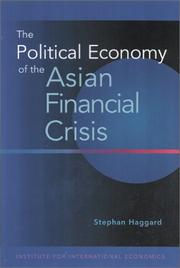| Listing 1 - 10 of 1065 | << page >> |
Sort by
|
Book
ISBN: 1283436744 9786613436740 1443836168 9781443836128 1443836125 9781443836166 9781283436748 Year: 2012 Publisher: Newcastle Cambridge Scholars
Abstract | Keywords | Export | Availability | Bookmark
 Loading...
Loading...Choose an application
- Reference Manager
- EndNote
- RefWorks (Direct export to RefWorks)
Crisis, Rupture and Anxiety: An Interdisciplinary Examination of Contemporary and Historical Human Challenges brings together a range of original contributions that seek to critically interrogate the concept of 'crisis', a seemingly omnipresent and defining metonym of our times. Both international and interdisciplinary in perspective, the leading doctoral scholars and early-career researchers represented in this volume unsettle hegemonic notions of crisis (and possible remedies) by exploring ...
Book
ISBN: 9838616966 9838616036 9789838616966 Year: 2015 Publisher: Pulau Pinang
Abstract | Keywords | Export | Availability | Bookmark
 Loading...
Loading...Choose an application
- Reference Manager
- EndNote
- RefWorks (Direct export to RefWorks)
Book
ISBN: 9789811936135 Year: 2022 Publisher: Singapore Springer Nature Singapore :Imprint: Springer
Abstract | Keywords | Export | Availability | Bookmark
 Loading...
Loading...Choose an application
- Reference Manager
- EndNote
- RefWorks (Direct export to RefWorks)
Book
ISBN: 9781529205534 9781529202137 Year: 2023 Publisher: Bristol Bristol University Press
Abstract | Keywords | Export | Availability | Bookmark
 Loading...
Loading...Choose an application
- Reference Manager
- EndNote
- RefWorks (Direct export to RefWorks)
Why did governments adopt austerity policies, and why were they so harmful? Why did the media largely ignore the majority of experts who opposed these policies, and allow politicians to get away with lies? And why did voters choose Brexit when the economic consensus was that it would harm living standards? Simon Wren-Lewis, winner of the SPERI/New Statesman Prize for Political Economy, is one of Britain's most respected economists. Since 2012, his widely-read Mainly Macro blog has been an influential resource for policymakers, academics and social commentators around the world. This book presents some of his most important work, telling the story of how the damaging political and economic events of recent years became inevitable. With new material including a preface by Nobel prize-winner Paul Krugman, these dispatches from the front-line serve as an essential guide to some of the most important economic and political issues facing us today, and as a warning to avert future disasters on this scale.
Book
ISBN: 3954895110 9783954895113 9783954890118 Year: 2013 Publisher: Hamburg Anchor Academic Pub.
Abstract | Keywords | Export | Availability | Bookmark
 Loading...
Loading...Choose an application
- Reference Manager
- EndNote
- RefWorks (Direct export to RefWorks)
Hauptbeschreibung Power shifts happened several times throughout history, but they do not occur frequently and are often connected with the use of force. Presently, there is a power shift from the western industrialized states, e.g., from member states of the European Union (EU), to Asian states, in particular China. However, in spite of this growth, it is disputed to what extent the rise of these economies already transcended into power and how it will develop in the future. What is clear by now is that the recent global financial and economic crisis was the worst one in post World War II his
Book
ISBN: 019932221X 0199322201 9780199322206 9780199322190 0199322198 Year: 2014 Publisher: Oxford Oxford university
Abstract | Keywords | Export | Availability | Bookmark
 Loading...
Loading...Choose an application
- Reference Manager
- EndNote
- RefWorks (Direct export to RefWorks)
Book
ISBN: 9781907994289 1907994289 9781907994272 1907994270 Year: 2013 Publisher: London London Publishing Partnership
Abstract | Keywords | Export | Availability | Bookmark
 Loading...
Loading...Choose an application
- Reference Manager
- EndNote
- RefWorks (Direct export to RefWorks)
The difficult economic climate in Europe and the United States since the financial crisis is set to continue as the New Normal, despite frantic efforts to stimulate growth. The long phase of expansion that lasted from the 1980s until 2008 was driven by easy money, cheap imports and confidence - all gone. And the shift of geopolitical power to Asia is permanent. This does not mean that Western economies are inevitably condemned to 'lost decades' ahead. They can rediscover productivity and growth - but governments face formidable political obstacles to the reforms this would require.

ISBN: 1281898031 9786611898038 088132308X 1435692241 9781435692244 6611898034 9780881323085 0881322830 9780881322835 9781281898036 0881322830 9780881322835 Year: 2000 Publisher: Washington, DC Institute for International Economics
Abstract | Keywords | Export | Availability | Bookmark
 Loading...
Loading...Choose an application
- Reference Manager
- EndNote
- RefWorks (Direct export to RefWorks)
Book
ISBN: 1443868582 9781443868587 9781322180649 1322180644 9781443847384 1443847380 Year: 2013 Publisher: Newcastle upon Tyne
Abstract | Keywords | Export | Availability | Bookmark
 Loading...
Loading...Choose an application
- Reference Manager
- EndNote
- RefWorks (Direct export to RefWorks)
With the occurrence of the US crisis, international focus has shifted from finance to financial stability. This book offers analyses of financial stability risk assessment at three main levels - namely international financial markets, banks and international trade - with the research being innovative, timely and much needed in terms of policy implications. New approaches to policy-making are also suggested to deal with the three crises that presently buffet the world: the debt crisis, an agei...
Book
ISBN: 1783717327 1783717319 9781783717316 0745336167 9780745336169 9781783717323 9781783717330 1783717335 9780745336213 0745336213 Year: 2015 Publisher: London, England
Abstract | Keywords | Export | Availability | Bookmark
 Loading...
Loading...Choose an application
- Reference Manager
- EndNote
- RefWorks (Direct export to RefWorks)
Essays from the Global Labour Column which highlight the role of labour in the fightback against neoliberalism.
| Listing 1 - 10 of 1065 | << page >> |
Sort by
|

 Search
Search Feedback
Feedback About UniCat
About UniCat  Help
Help News
News